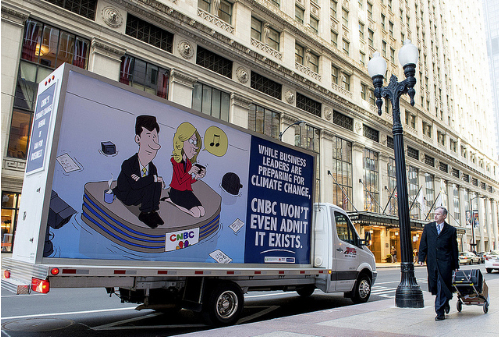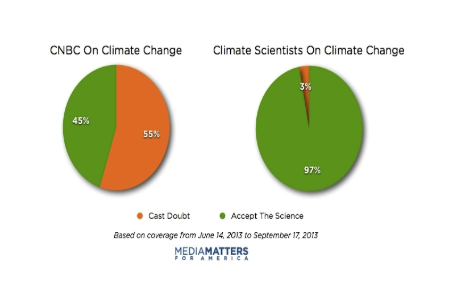Expose CNBC’s Climate Denial

Update 11/19/2013: The financial districts in New York and Chicago looks a little different for a week in late 2013.

That's because 20-foot-long, fuel-efficient mobile billboards -- made possible by supporters of Media Matters and our allies at Forecast the Facts and Environmental Action -- roamed Wall Street and the Chicago Loop, calling out CNBC for denying climate change.
For more photos of the ads in action, check out our photo album on Facebook.
Thousands of viewers in CNBC's core demographic now know that the network isn't a source for reliable business information relating to climate science, and CNBC is experiencing the consequences: damage to its reputation with its most valuable audience.
We'll check back regularly on CNBC's climate coverage. But even if the network continues to intentionally mislead its viewers, we can keep the pressure on by making sure that business and financial leaders know that CNBC isn't reporting the facts they need to make informed decisions.
In June, Media Matters released a report showing that business news channel CNBC had cast doubt on science in more than half of its 2013 climate change coverage. As the first analysis of its kind, the report was a wake-up call: by regularly denying climate science, CNBC was falling short of its core mission of providing “fast, accurate, actionable, [and] unbiased” business news to its viewers.
Environmental groups mobilized in response to the findings, collecting 45,000 signatures urging CNBC to improve its climate reporting.
Four months after first sounding the alarm, Media Matters conducted a follow-up study to see if CNBC had adjusted its coverage. Remarkably, we found that climate denial at the network actually increased, rising from 51 percent to 55 percent of climate reporting. Worse, one-third of the segments that did accurately report the science occurred during a limited “special week of climate coverage”on Worldwide Exchange, which airs at 4 AM ET.

Scientists overwhelmingly agree that climate change exists, and more and more businesses are deciding that they can’t afford to wait and see. According to a recent study, more than 70 percent of companies think climate change can significantly affect their revenues—and many are already hedging against the risk. In fact, businesses are becoming leading climate advocates: more than 650 major U.S. companies have already signed a letter calling for stronger federal clean energy laws, and just last month, nearly two dozen leading U.S. businesses announced their support for carbon pollution standards proposed by the Environmental Protection Agency for new power plants.
In business, there's a clear trend toward taking climate science seriously—but on CNBC, there's a clear trend toward dismissing and distorting it. As a network that prides itself on serving the information needs of the business community, CNBC is failing its viewers and damaging its reputation by rejecting science.
We sent a letter to CNBC, offering to help develop a plan to gradually improve its climate reporting. The network dismissed this outreach. CNBC is ignoring scientists and media watchdogs, so we brought the truth to an audience it can't ignore: its viewers.
CNBC has had multiple opportunities to address its climate denial problem, but has only let it get worse. At this point, the network can no longer claim ignorance: CNBC is intentionally misleading its viewers about climate change, and it needs to stop.
With your participation, we scaled up our efforts to expose the bad business of CNBC's climate denial to the viewers that determine its bottom line.
This campaign is now closed.